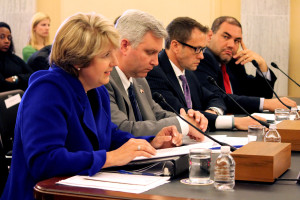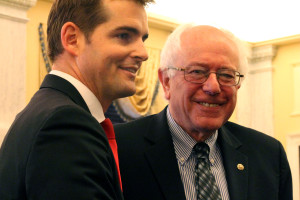
(Jennifer-Leigh Oprihory/MEDILL)
WASHINGTON – Leaders from the veteran and nonprofit communities gathered during a Wednesday Senate hearing to discuss how to improve the flow of resources and support services to veterans.
The hearing aimed to examine how outreach by the Veterans Affairs Department and its partnerships with community organizations are helping put resources back into veterans’ hands.
“In many areas, VA does enormously good work and enormously important work,” said Senate Veterans’ Affairs Committee Chairman Sen. Bernie Sanders, I-Vt. “But no matter how good the programs are that the VA has … it doesn’t mean anything to the veteran if the veteran does not know what that program is about.”
Tommy Sowers, VA’s assistant secretary for public and intergovernmental affairs, said after the hearing that he agreed.
Sowers said VA Secretary Eric Shinseki “and our office [are] committed to making sure that every veteran knows that benefits and services are out there.”
Some organizations, such as the Community Blueprint program managed and based out of the volunteer nonprofit Points of Light, are collaborating with other groups on the local, state and national levels to improve the delivery of supportive resources to veterans.
The program was born out of a desire for organizations “to help veterans, service members and their families in a coordinated, comprehensive and community-wise way,” Mike Monroe, vice president of military initiatives at Points of Light, told the committee.
The effort — operated by an advisory council composed of representatives from 18 other organizations, including the Red Cross — resulted in the creation of a set of best practices for helping returning veterans with issues such as employment, family strength, behavioral health, education and reintegration.
The Corporation for National and Community Service, on the other hand, helps veterans both give and receive national service. According to CEO Wendy Spencer, CNCS collectively has employed more than 43,000 veterans as volunteers through AmeriCorps and Senior Corps. Additionally, it sends volunteer staff to VA facilities and veteran-focused nonprofits. On a state and local level, its grantees have provided help for student veterans, employment training and placement, mentoring and more.
Finally, location-specific partners, such as the nonprofit Robin Hood Foundation and the Massachusetts Department of Veterans Services, serve veterans in their home areas.
Robin Hood, formed to fight poverty in New York City, added a veterans initiative in 2011. In conjunction with former Joints Chiefs of Staff Chairman Adm. Mike Mullen, it raised $13 million to grow new programs to help veterans and their families. So far, it’s made 25 grants that provided more than $7.5 million in aid to serve more than 6,500 veterans and their families, and looks to spend an additional $4.5 million in the coming year.
Among their efforts: helping needy veterans with case management and accessing public services, providing free legal services, getting mental health services for veterans and their families, finding job training and placement services, and helping with housing and education.

